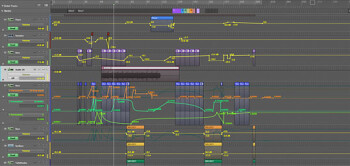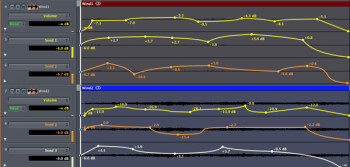Before moving on to the next processor in the mastering chain — the limiter/maximizer — it's appropriate to talk about a topic often overlooked by many people learning to master: Automation.
The basics
While automation is a standard practice during mixdown for most home studio owners, it is usually not considered when they reach the delicate mastering stage. However, applying some automation to the different processors can be incredibly effective!
A song evolves gradually over time, both at the frequency and dynamic levels, and even “spatially.” As such, there are high odds that the improvements and/or corrections you’ve made aren’t appropriate throughout the entire song or that they are even outright wrong for a given part. And that’s when automating plug-in parameters with your DAW becomes interesting.
If the concept of automation is completely new to you, we recommend you to take a look at a previous Audiofanzine article, “DAW Automation 101”, where we explain its main features.
In practice
It is impossible for us to cover all scenarios where automation is pertinent. Nevertheless, here you have several textbook cases that might inspire you.
Take vocals, for instance. In theory, there will be certain parts of the song where there will be no singing. So, if during mastering you decided to emphasize certain frequencies to make the vocals stand out, what’s the use of such EQing during instrumental parts? Wouldn’t it be wiser to play with automation to limit the EQing to those moments when the singer is actually singing? What’s more, this would also help you further put the vocals in relief.
In the same order of ideas, if you have applied the trick of boosting the root note of the bass guitar to accentuate the bass line and the song changes key in the middle of the song, it would be wise to automate the EQ so that it follows such changes.
In the stereo enhancers article from this series, we talked about the concept of contrast to illustrate how you can improve the “dramatic” effect of a song. In mastering, automation is the ultimate tool to achieve such sonic contrasts. Applied to the verse/chorus form, it would be interesting to have an enhanced verse, in terms of stereo width, followed by a more mono chorus with a bit of harmonic exciter as a bonus, to give it that in-your-face effect to the sound. Add to that an automated reverb in the same line and you’ll end up with a stunning result.
There you have a couple of ideas. Now it’s up to you to experiment and find your own “recipes.” It will obviously take you time, but the results are certainly worth it!


